Anchor Social Impact Report with The Purpose Coalition


Anchor Social Impact Report with The Purpose Coalition

It is expected that by 2037 one in four people will be over 65. In an ageing society, ensuring that people have the housing, care and support services they need as they get older is more important than ever.
The pandemic demonstrated how vital such services are. It showed that giving older people the care they need is crucial and those providing that support and the communities they are from must also be properly supported. It also revealed the significant impact of health inequalities on our most disadvantaged communities where life expectancy and serious illness vary so greatly from more privileged areas of the country.
Organisations like Anchor not only have a key role to play in our health and social care system through the provision of specialised housing and care services but can also lead the way in delivering opportunity across the country. This report offers an insight into the range of work it does to make a difference for its residents, its colleagues and its communities.
Its work has been assessed against a framework of 14 interconnected goals that measure social impact, shaped by expertise from academia and business and adapted to tackle unique challenges in the UK. They emphasise environmental, social and economic aspects and are focused on critical life stages and challenges. These Purpose Goals aim to level the playing field across the UK by providing a shared framework, uniting diverse efforts for change.
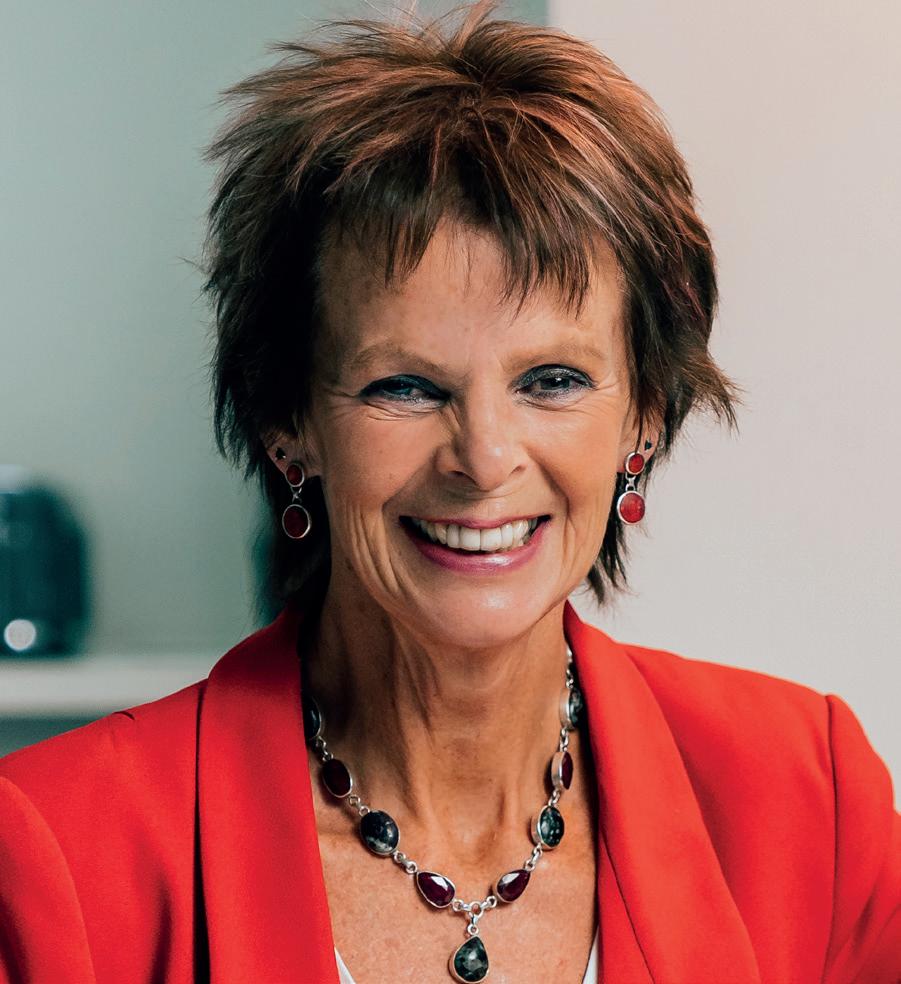
Anchor is driving change across many of the Goals. There is, of course, a sharp focus on health and wellbeing for residents. This is extended to its staff in a range of areas, including bereavement, loneliness, menopause and digital and financial inclusion. It is particularly successful in attracting those from its local communities, for example through apprenticeships or educational partnerships, to ensure that there is a pipeline of diverse talent to support its business. It recognises that the development of its staff with clear, supported career pathways is vital to their retention. It also understands that the health and social care sector is key to building sustainable communities, whether that is in the design of its buildings and external spaces or in the impact of its environmental strategy.
Critically, Anchor has the potential to be a powerful voice for the sector, advocating for the older people it serves and for those who work in it. It is a sector which will continue to make a tangible difference and where a purposeful approach can deliver opportunity while also being an integral part of its long term sustainability.
As England’s largest not for profit provider of housing and care to older people, we exist so people can love living in later life.
We’re the largest operator of social housing for older people and the fourth largest residential care home operator in England, operating more than 35,500 social rented homes, more than 12,500 leasehold homes and 120 care homes. We support more than 65,000 residents and work with more than 10,000 colleagues in almost 1,700 locations across England, covering more than 85% of local council areas.
We recognise that our scale brings responsibilities and are grateful for the opportunity to work with the Purpose Coalition to celebrate the social impact we have achieved thus far and to build on it.
The Purpose Goals provide a helpful framework to consider how we benefit the communities in which we work and to demonstrate the breadth of our impact. Indeed, we play a role in many of the 14 Goals.
We support young people into meaningful roles through our apprenticeship opportunities, support fair career progression through our Leadership Pathways approach and run initiatives to support a diverse and inclusive culture, such as our reverse mentoring helping senior leaders to understand the barriers that underrepresented groups experience in the workplace.
Meanwhile, our work to support residents’ financial, social and digital inclusion sits alongside other wellbeing support for both

residents and colleagues. We also have an eye on the residents of the future. We have taken strides toward achieving net-zero, investing heavily in retrofitting energy efficiency measures into existing locations while ensuring our new developments utilise low and net zero carbon technologies such as air source heat pumps and renewable energy generation.
We are a Community Benefit Society and proudly not-for-profit. This means every penny we make is reinvested into our properties and services, building more and innovating for the future, rather than being distributed outside the organisation.
Listening to the older people we serve and shaping our approach around their priorities is central to the way we work. It is also what will enable us to achieve our vision of transforming housing and care so everyone can have a home where they love living in later life.
Anchor is the United Kingdom’s largest provider of housing and care services tailored to meet the needs of individuals in later life. With a dedicated commitment to enhancing the quality of later life, Anchor has been committed to its mission for more than six decades. In today’s ageing society, the demand for its housing, care and support services has never been more vital.
Anchor is firmly dedicated to fostering choice and opportunities for all. Its approach is based around a deep commitment to actively listening and tailoring its services to meet residents’ unique requirements.
It takes pride in its not-for-profit status, ensuring that every pound generated is reinvested into improving its properties and services, ultimately fostering innovation and enabling people to find homes where they can cherish and make the most of their later years.

Its services span across more than 85% of local councils in England.
Anchor oversees a portfolio of 54,000 homes available for both rent and sale, exclusively designed for individuals aged 55 and above. These homes are distributed across nearly 1,700 sites, as well as 120 care homes, and serve more than 65,000 residents. Its services span across more than 85% of local councils in England.
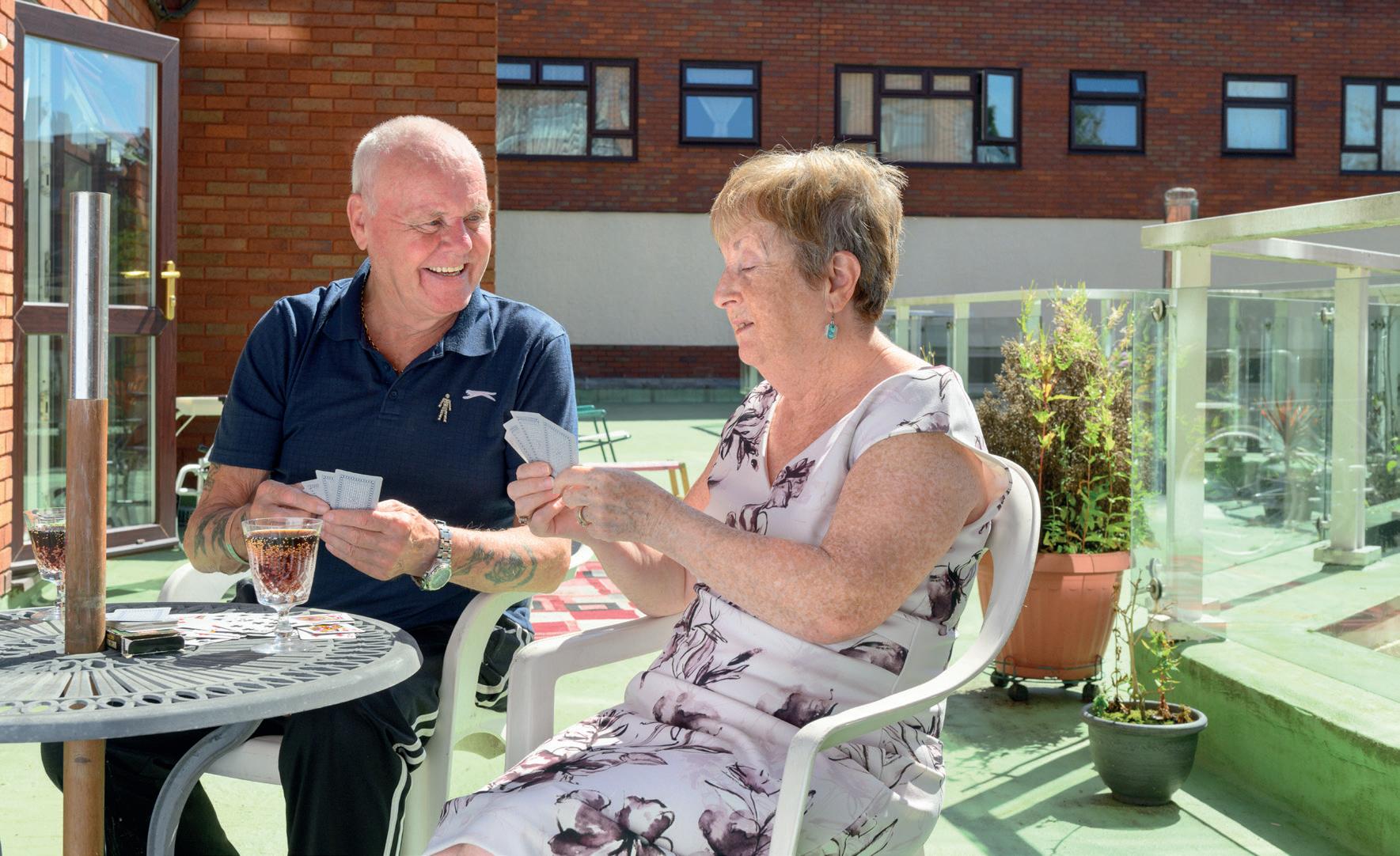
Community development: Anchor develops housing solutions that serve as a positive choice for older people, fostering vibrant communities that encourage social interaction and reduce isolation. It provides a range of services to support wellbeing, including the ‘Anchor on Call’ 24/7 telecare service for tenants and homeowners and financial advice through its Be Wise service. Additionally, through its development programme, it anticipates delivering an average of at least 500 new homes a year over a rolling 10-year period. This is in addition to growing the number of homes its provides for people in residential care.
Resident-first approach: The organisation is underpinned by a resident-first philosophy. It actively listens to understand evolving needs and concerns, enabling it to adapt its homes and services, and support every resident’s needs accordingly. Anchor engages residents through various channels, including regular meetings with residents and their families in its care homes. This ongoing dialogue
informs service enhancements and ensures a wide array of choices for residents.
Advocacy: Anchor is a vocal advocate for issues relevant to older people in the UK, taking the lead in debates and influencing the market to drive continuous improvements in housing, care and related services. It runs campaigns and publishes research that highlights how its innovative services enable older people to comfortably enjoy their later years. It also actively works to support and influence government policy on crucial issues including social care reform.
Employer of choice: Anchor is a leading employer with a workforce of more than 10,000. It offers competitive compensation and sector-leading benefits, with a strong commitment to learning and developmentsupporting new and existing colleagues taking the next step in advancing their careers. It is also dedicated to promoting diversity and inclusion, with colleague networks influencing its approach.
Anchor’s commitment to social impact is underpinned by a fundamental belief in the importance of a nurturing home environment, particularly in the later stages of one’s life. Anchor prioritises wellbeing and community connection and this focus will only become more important as the population continues to age - with projections indicating that one in four individuals will be over 65 by 2037.
An essential aspect of Anchor’s approach is the provision of more and improved housing options designed specifically for the older people of today and tomorrow. This is supported by the recruitment and retention of exceptional individuals who not only understand the unique needs of their residents but also contribute to a positive work environment.
Moreover, leveraging its scale and expertise, Anchor seeks to drive greater efficiency, maximising the resources available to provide more and better homes. It also aims to to be a prominent advocate for the wellbeing of older adults - collaborating with governmental bodies and partners to shape local services and policies.
Anchor has received a number of awards, including for its inclusivity, pet-friendly approach for residents and for its innovation in recruitment.
This approach not only makes them more influential but also allows for greater efficiency in resource allocation, maximising the impactof its not-for-profit status.
Rooted in its founding mission from more than six decades ago, Anchor’s unwavering dedication to providing high-quality and affordable housing and care solutions for older individuals remains at the core of its operations.
In recognition of the organisation’s commitment and sector-leading performance, Anchor has received a number of awards, including for its inclusivity, pet-friendly approach for residents and for its innovation in recruitment. The organisation has also been repeatedly recognised in the National Top 20 Care Home Group in the carehome.co.uk annual awards, demonstrating its continued excellence and dedication to its residents’ well-being.
Anchor has also received accolades for specific projects, such as The Mill House in Skipton winning the prestigious National Luxury Care Home of the Year Award for 2023/24 from Knight Frank, Best Urban Regeneration Project for Walrond House in Hackney at the 2021 Inside Housing Development Awards and the Small Development of the Year for the same project at the 2021 HealthInvestor UK Senior Housing Awards.
Additionally, Anchor has been acknowledged for its inclusive workplace culture, becoming, in 2023, only the third organisation ever to achieve Gold in the Inclusive Employers Standard.
Anchor and the Purpose Coalition are working together to tackle the UK’s biggest challenges facing residents, colleagues and communities. From helping people with the cost-of-living crisis in the short term to boosting social mobility across the country.
The cost of living crisis affects us all, but particularly the poorest. It will require action from all sections of our society - whether politics, business, or all of us as individuals helping out our friends, neighbours, and local communities where we can.
The Purpose Coalition measures organisations against what they are doing for their customers, colleagues, and communities through the Purpose Goals.
In 2015, as Secretary of State for International Development, Rt Hon Justine Greening led the UK delegation to the United Nations (UN). Along with 184 international partners, she helped to establish the UN’s Sustainable Development Goals (SDGs).
In 2017, the SDGs were made more ‘actionable’ by a UN resolution adopted by the General Assembly which identified specific targets
for each goal, along with indicators used to measure progress towards each target.
These 17 interlinked, global goals were designed to be ‘a blueprint to achieve a better and more sustainable future for all’. The SDGs emphasised the interdependent environment, social and economic aspects of development by centralising the role of sustainability. As Secretary of State, Justine recognised how useful a common set of accessible but ambitious objectives could be in galvanising action to effect change.
Since then the COVID-19 pandemic and the cost of living crisis have only exacerbated many of the problems relating to social inequality in the UK.
The United Kingdom now has an opportunity to address these issues and level up but that requires updated and specific goals in order to outline, inspire and measure progress.
The Purpose Goals build on the foundations laid by the UN’s SDGs by outlining 14 clear goals. They draw on expertise from academia and businesses which has been applied to the unique challenges facing the UK.
The COVID-19 pandemic and the cost of living crisis have only exacerbated many of the problems relating to social inequality in the UK.
The Purpose Goals focus on key life stages and highlight the main issues that need to be resolved in order to create a level playing field for all in this country. The Goals are to guide how the urgent ambition to level up the UK can actually be achieved. The impact of the work carried out to do this can, and should, be measurable.
Sub-goals with quantifiable targets and measurements against which progress can be charted within the 14 goals are being developed by the Purpose Coalition. This will create a more transparent and measurable framework with which to monitor and subsequently address problems of social mobility and inequality. The Purpose Goals are designed to look at the outcomes of CSR strategies and measures that organisations operate. Many organisations are doing outstanding work and making important contributions to society but are still measuring this via inputs.
Crucially, these Goals are a shared framework. Justine and the wider Purpose Coalition, of which Anchor is a key member, believe that with a common understanding and objectives, there can be action that drives change on the ground. Distinct entities, including universities, businesses, policy-makers, and public sector bodies can work together, with the shared Goals being a uniting and motivating foundation for progress. As the problems which cause social inequality in the UK are interlinked, it seems that the response to these problems must also be collaborative.
The Purpose Coalition has encouraged businesses and universities to share their own best practice with other organisations so they are not only demonstrating their own commitment, but creating a shift towards purpose-led organisations. The Goals can encourage an extension of this co-operative exchange of information which can be used to address the cost of living crisis, and later level up the UK.

3.1.1 Apprenticeship opportunities
Anchor runs an internal apprenticeship route for existing colleagues, which currently supports over 400 employees across the organisation.
Every young person and adult deserves to have the choice of a high quality route in education, employment or training.
Traditionally, we’ve pushed our young people down an academic path, to A levels and then onto higher education and a degree at university. Equally important is a strong option for a non-academic route, latterly through apprenticeships and the growing availability of T-Levels.
It has also established a dynamic apprenticeship programme aimed at attracting talented external candidates into Anchor. It offers fixed-term contracts, ranging from 15 to 24 months, across various apprenticeship levels and departments in Anchor including:
Level 2 Adult Care Worker
Level 2 Production Chef
Level 2 Hospitality Team Member
Level 2 Customer Service Practitioner
Level 2 Finance and Accounts
Level 3 Human Resources Support
Level 3 Business Administration
Level 3 Recruitment Consultant
Level 3 IT
Level 3 Digital Marketing
Level 4 Junior Project Manager
Throughout the apprenticeship journey, each candidate is granted a dedicated study day focused on completing their apprenticeshiprelated coursework. Each apprentice has the opportunity to apply for permanent positions within the organisation, all while continuing to work towards completing their apprenticeship.
To ensure the success and growth of its apprentices, both Anchor’s managers and its talent team provide ongoing support. This includes regular check-ins with apprentices throughout their journey, faceto-face visits with managers, and monthly apprenticeship drop-in sessions for managers. These channels serve as a critical platform to discuss any queries or requests for support.
Since 2021 Anchor has achieved a 72% conversion to permanent role from the Programme.
3.1.2 Strategic recruitment
Anchor has recently developed a new strategic graduate recruitment scheme underpinned by an ambition to boost diversity in its Property and Assets Team. This led to the recruiting of two graduates, and the organisation is looking to extend this scheme further.
3.1.3 Partnership across education
Anchor has worked with the careers and employability service at the University of Bradford to support first year students to develop their understanding of the world of work. The aim of the project was to:
• Allow students to develop their understanding of the world of work early in their university journey;
• Support other local employers to make connections with students;
• To provide an opportunity to share best practice on recruiting and retaining a diverse workforce;
• To develop an understanding of the range of roles available to graduates that may or may not be related to their degree.
The organisation has also established relationships with Bradford College and Redcar & Cleveland College. This has allowed the organisation to support work experience and placements within Care Services and Central Support.
3.1.4 Graduate pathway
Anchor welcomed its first cohort of graduates into its Property and Assets team in September 2023. Their graduate placement with Anchor will lead to the successful attainment of Chartered Surveyor status, which will help the graduates throughout their careers.
The organisation is looking to more than double its graduate programme into next year and beyond, with plans already to repeat the intake in the Property and Assets team, while adding a further two graduates in its Development team and 2 graduates in its Central Support team.
In promoting its graduate pathway, Anchor engaged with over 20 universities to support with the promotion of the programme for its September 2023 intake. Of the 20, the organisation forged closer ties with eight specific Universities who taught the Royal Institute of Chartered Surveyors (RICS) accredited degrees that the team required.
Upon engagement with the eight universities, Anchor were invited in to interact with specific groups of students based on their degree courses, as well as specific time to meet and present to a number of students - both face-to-face and virtually. Its partnerships with these universities continue to grow for its September 2024 intake.
Anchor welcomed its first cohort of graduates into its Property and Assets team in September 2023.
Anchor is engaged with the Baker Dearing Trust to review opportunities to work on a project basis with the Trust’s technical colleges around Health and Social Care and Engineering. The Baker Dearing Trust works closely with over 40 University Technical Colleges - with a growing portfolio of partnerships - with Anchor’s work extended across all of these institutions, with a particular focus on those teaching healthcare related courses.
Mercy, who is currently studying Health and Social Care, has recently secured a part-time role as a care assistant following her placement at Kerria Court - an Anchor care home in Birmingham. Mercy said of her placement and new role at Anchor:
“I am a student at University of Birmingham, completing a Health and Social Care qualification, I am in my second year of a threeyear course. As part of my course, I needed to work in a care setting. My tutor had already been working with Anchor and suggested this as my placement. I went to visit Kerria Court and was greeted by the residents and all the staff.
My placement was one day a week for three months, tasks including activities with residents, getting to know their life history, supporting at mealtimes and any general tasks I was able to do. At the end of my placement and speaking with the manager Amanda, I was aware there were part-time care vacancies. I am at university four days a week. Amanda was able to give me a part-time role around my Uni hours.
I am really enjoying my role, I have care experience of looking after my grandmother. When I first started, I was a little bit nervous but with the support of Amanda and all the staff, my nerves soon disappeared.”
A key aspect of this partnership is exploring ways to support people with dementia, dysphasia, digital skills and more, within the Health and Science Sector for T-level and GCSE students, as well as offering work placement opportunities.
Anchor also maintains close relationships with local colleges. This allows the organisation to support other work experience and placements within care services and central support.
Opportunities for career advancement for all should be based on ability and potential, not connections.
The chance to keep developing once in work, and progress in a career, isn’t just important from the perspective of increasing earnings, it’s about how people can continue to feel challenged and learn even once they’ve left their school years behind. Businesses like Anchor that work out how to provide those opportunities to keep growing and moving forward will not only boost social mobility but will do better themselves.
Anchor is actively reviewing career pathways across the organisation. It is creating content to support colleagues in better understanding and accessing progression routes available to them. This will also support employees in improving their skills, training, and experience needed to progress.
The organisation also runs its Assessing Talent initiative and is starting to roll out across the business - with a focus on the potential and performance of teams and individuals. This is supported by the use and embedding of the 1:1 process, personal development plans, and career conversations.
It ensures colleagues feel supported throughout their development journey through its Mentoring and Reverse Mentoring Programme. The project is in its second year and is experiencing positive results across the organisation, with a digital ‘matching’ solution in the pipeline to allow colleagues to review a mentor profile to start their mentoring relationship
Anchor is committed to supporting the progression of its colleagues. MyFuture, its internal progression programme, supports person centred growth to help create the leaders of the future.
It also offers a number of Leadership Pathways modules that are an introduction to practical leadership principles and theories - supporting active learning and knowledge transfer across Anchor. The development of a new Leadership Blueprint will see an agreed set of competencies for all levels of management - helping to raise the professionalisation and skills of its leaders.

Anchor’s Moving Up programme supports Black and Asian minority groups who are managers or aspiring managers and have the desire and drive to progress in their careersbut are facing barriers preventing them from doing so. The programme has had a significant impact on the participants who’ve taken part.
The 2023 cohort completed the programme in May, with seven colleagues from minority ethnic backgrounds completing the course. All delegates reported feeling that their confidence had improved from completing the programme, with all responding that the course “met their objectives” and that the course was “excellent” or “good” against a number of factors.
Anchor colleagues said of the programme: “I feel it has been empowering and has motivated me to want to achieve more”.
“This was a very thought-provoking, inspiring and life-changing course.”
Members of Anchor’s extensive colleague networks are invited twice a year to take part in its reverse mentoring programme.
The programme allows senior leaders at Anchor to understand the barriers and challenges that underrepresented groups experience in the workplace. For example, in June 2022, the organisation initiated a cohort of 14 reverse mentoring relationships.
The mentors noted that the conversations were engaging and helpful, with some members choosing to continue a mentoring or coaching relationship outside of the programme.
However talented a person is, being trapped in debt or being unable to access capital massively hinders access to opportunity. Whether it’s being able to afford day-to-day essentials and housing or putting money aside to have a decent retirement, managing money and getting good advice and skills to do so can make all the difference in people being able to make the most of their potential.
Supporting colleagues
Anchor has offered a number of workplace loans and savings opportunities through Salary Finance, making it easy and convenient to make deposits and repayments through payroll at competitive interest rates.
It also established a partnership with MoneyHelper to signpost colleagues to free and unbiased financial guidanceparticularly focusing on debt management and the cost of living crisis.
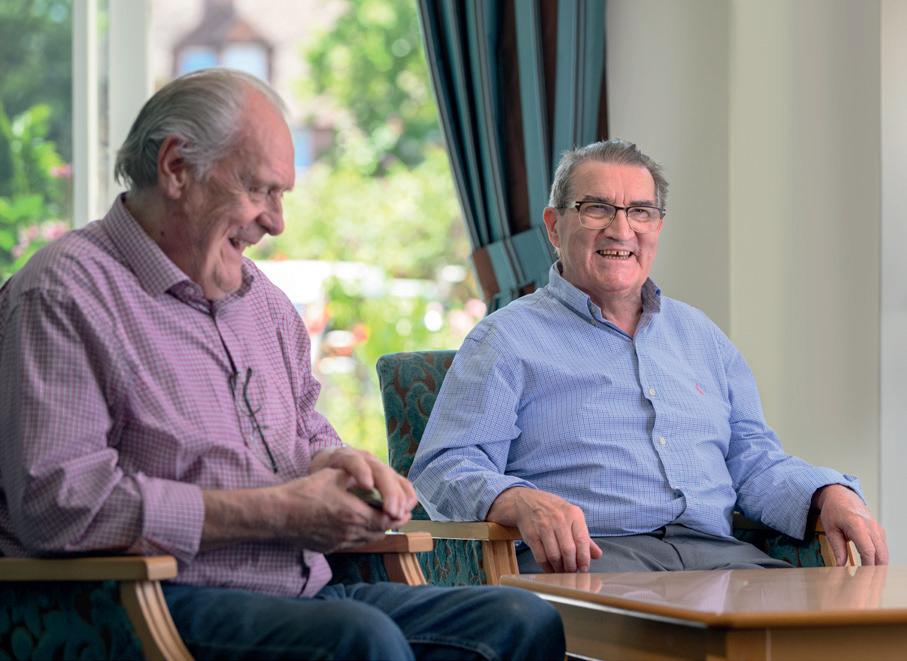
Colleagues across the organisation have taken part in webinars focusing on debt management and cost-of-living issues as well as pensions and everyday financial education - drawing expertise from financial wellbeing specialists.
Anchor also took part in the Energy Support loan scheme from Oct 22 to Mar 23 making it easy for colleagues to advance future payon interest free terms and with a threemonth moratorium on repayments - to cover high energy bills over the winter.
Anchor addresses the critical issue of financial inclusion through its ‘Be Wise’ service. This supports all of its housing residents in maximising their income by claiming all benefits they are entitled to. The service can also help residents find the best deals on energy and insurance.
In 2022/23 this helped residents claim a total of £4.3 million in entitlements through over 23,000 calls handled, 3,300 cases opened, an an average of £4,900 gained by residents in income or savings.
The team also allocated its Resident Support Fund, which it introduced to help residents through the rising cost of living.
 Widening access to savings & credit
Widening access to savings & credit

Anchor invested in expanding the financial support team so they can help even more people during turbulent financial times.
One couple who benefited were Mr and Mrs P. They were caring for each other and called to enquire about disability benefits for Mrs P as long term health conditions were affecting her mobility.
The Be Wise team were able to support claims for Carers Allowance and Attendance Allowance, which entitled them to a severe disability premium for means tested benefit calculations and to pension credit guarantee. As a couple receiving pension credit guarantee their housing benefit increased to full entitlement of £115.92 a week and their
council tax support was £26.46 which meant they no longer paid council tax.
All in all this couple ended up being £12,536.68 a year better off due to Anchor’s support and received backdated payments due to the length of time for awards to be processed of just over £4,000.
Sam Scotcher, Financial Inclusion Manager, said: “This case took many hours of work. Without the technical knowledge, determination and support from our Advisor it would not have come to fruition.”
For Mr and Mrs P, it was worthwhile. “We would 100% recommend the service to other residents. The help we had has changed our lives,” they said. “We can travel and take holidays to see our friends and family to enjoy ourselves.”
Health and wellbeing inequalities create barriers to opportunity and improving social mobility.
Good health and wellbeing are often a precursor to a person being in a position to make the most of their talents and in work, empowering people to consider taking the next step in their career. The COVID-19 pandemic shone a stark light on the health inequalities in the UK and how they impact wider life.
Colleague offering
Anchor acknowledges and prioritises its employees’ wellbeing - understanding this as a crucial part of its social impact agenda, benefitting both the organisation and its colleagues. It launched access to four basic key health services: a remote GP, mental health support, a physio, and medical second opinion. This - along with the financial support measures mentioned above - is all part of Anchor’s comprehensive package available to each of its colleagues.

Employee physical health
Crucial to Anchor’s colleague offering is the prioritising of its employees’ physical health, especially after the public health impacts of the COVID-19 pandemic. The organisation supports its employees through an extensive and proactive agenda:
1. Help@Hand - a completely confidential digital health service supporting access to four health services via one easy-to-use app. These include the opportunity to book and access unlimited virtual health services, unlimited mental health support, eight virtual physiotherapy sessions a year, and two medical second opinion consultations a year.
2. Gym discounts and free gym membership deals as well as discounts on exercise equipment to free digital fitness classes.
3. Free flu jabs and eye tests.
4. Discounted AXA Healthcare insurance.
5. Sick pay.
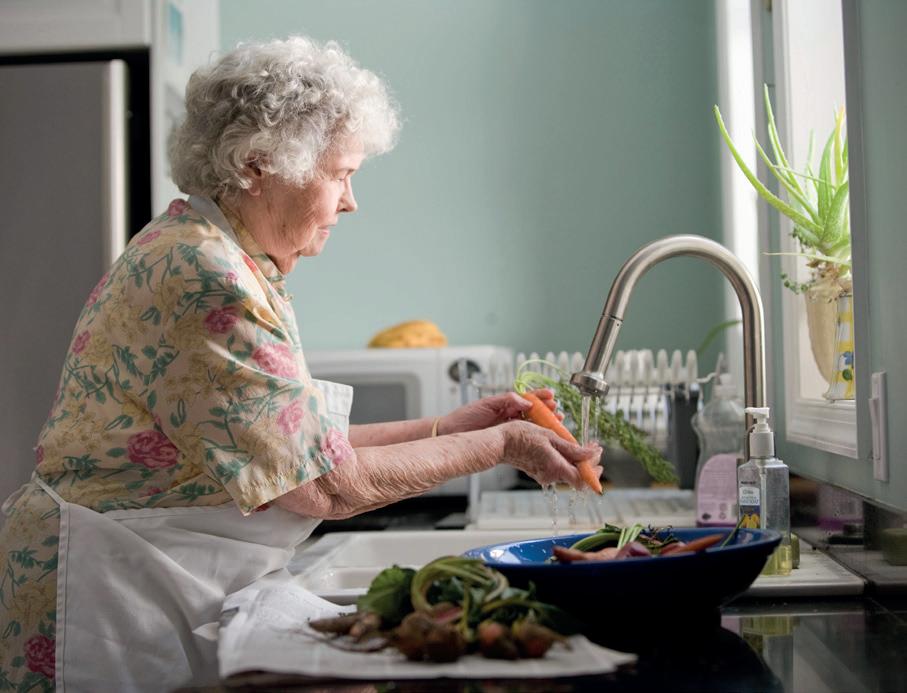
Anchor extends its employee health support to mental health and wellbeing acknowledging it as a valuable nvestment for the organisation, across a number of key focus areas:
Colleague Advice Line: A free and confidential service. Employees can speak to an advisor 24/7 by telephone or WhatsApp and SMS - as well as being able to access a range of materials and e-learning on the web or from the handy app.
Bereavement support: Anchor acknowledges that losing someone, such as a family member, friend or colleague is something that happens to everyone at some point. It offers support, guidance, and tools to help colleagues experiencing bereavement and grief.
Menopause support: Around 13 million women are currently perimenopausal or menopausal. With women making up the majority of the organisation’s workforce, the menopause is something many will experience. As such, the organisation has put together a number of resources to support colleagues.
Wellbeing resources for managers: Anchor offers a comprehensive guide for managers to support their diverse teams across changing working patterns.
Family support: Anchor also provides fertility support, maternity pay, as well as a ‘Care Concierge’ confidential telephone guidance service.
Loneliness at work: As more roles are moving to remote working, and colleagues are taking advantage of more flexible working patterns, Anchor has recognised that some of its employees may feel disconnected from their wider teams. As such, it offers a number of tips as well as guidance on its myLearning platform for performing and being connected while working from home.

Leah said of her time at Anchor: “I’ve recently celebrated my five years at Anchor since starting back in 2019 as an HR Apprentice. The best part of my job has to be working with homes and their teams, learning more about care and building relationships.
From my own personal experience at Anchor, it’s a very inclusive environment. For as long as I can remember I’ve had chronic anxiety. It got to the point where I needed to take some time off from work and focus on myself. My manager has supported me along the way. I was able to make use of reasonable adjustments such as flexibility in my shifts to attend therapy sessions, as well as being able to spend less time in the office. I’ve really felt that I can be comfortable being my whole self at Anchor because I’ve been thoroughly supported by my team and manager at every step.”
Direct mental health support
Anchor ensures all colleagues are supported through a number of strategic mental health mechanisms.
Colleagues are encouraged to self-enrol in the Being Well Mental Health at Work course. Line managers can also access the new Supporting colleagues with mental health and during periods of long-term absence video.
Crucially, line managers can also enrol in the Let’s talk about mental health course to provide them with the tools to have effective conversations with their team about mental health - ensuring all leaders across the organisation can support colleagues. The My Being Well workplace group also offers inspiration, activities, and challenges throughout the year to help support employees’ mental health. Mental Health Matters is another workplace group where colleagues share news, best practice, and top tips on all things relating to mental health. The Mental Health at Work website also offers a wealth of support and resources, pooled together from different organisations, such as Mind and the British Medical Association.
Taking a resident-first approach
Anchor is underpinned by a resident-first approach to the service offered within its properties and sites. It offers a range of ways for residents to improve their physical and mental wellbeing through its Be Well services.
One of its most popular Be Well services is Be Active - Anchor’s wellness and movement programme. The scheme aims to help improve strength, coordination, and balance.

Be Active provides a range of resources from exercise routines and podcasts to tips on how to keep the mind active. It also offers live exercise sessions four times a week via Zoom.
Residents in the organisation’s care homes also benefit from Be Active’s Zest activity programme, which is designed for all abilities and features a mix of active routines, dance moves, mobility work and gentle moving and stretching. Working across its housing and care services, Anchor used that expertise to also create a live seated Zest activity for housing residents who could benefit from it. TV fitness specialist Diana Moran helped the organisation promote its fitness activities in March 2022 as part of efforts to encourage residents and colleagues to get moving to hit the government’s recommended target of 150 minutes of activity per week.
Anchor offers online support through Be Digital, allowing residents to learn a new skill through Be Skilled or hear from guest speakers and have a conversation with other residents through the Be Connected service. The Be Connected service aims to reduce social isolation and loneliness through a range of services including befriending, coffee mornings, choir, and book clubs.
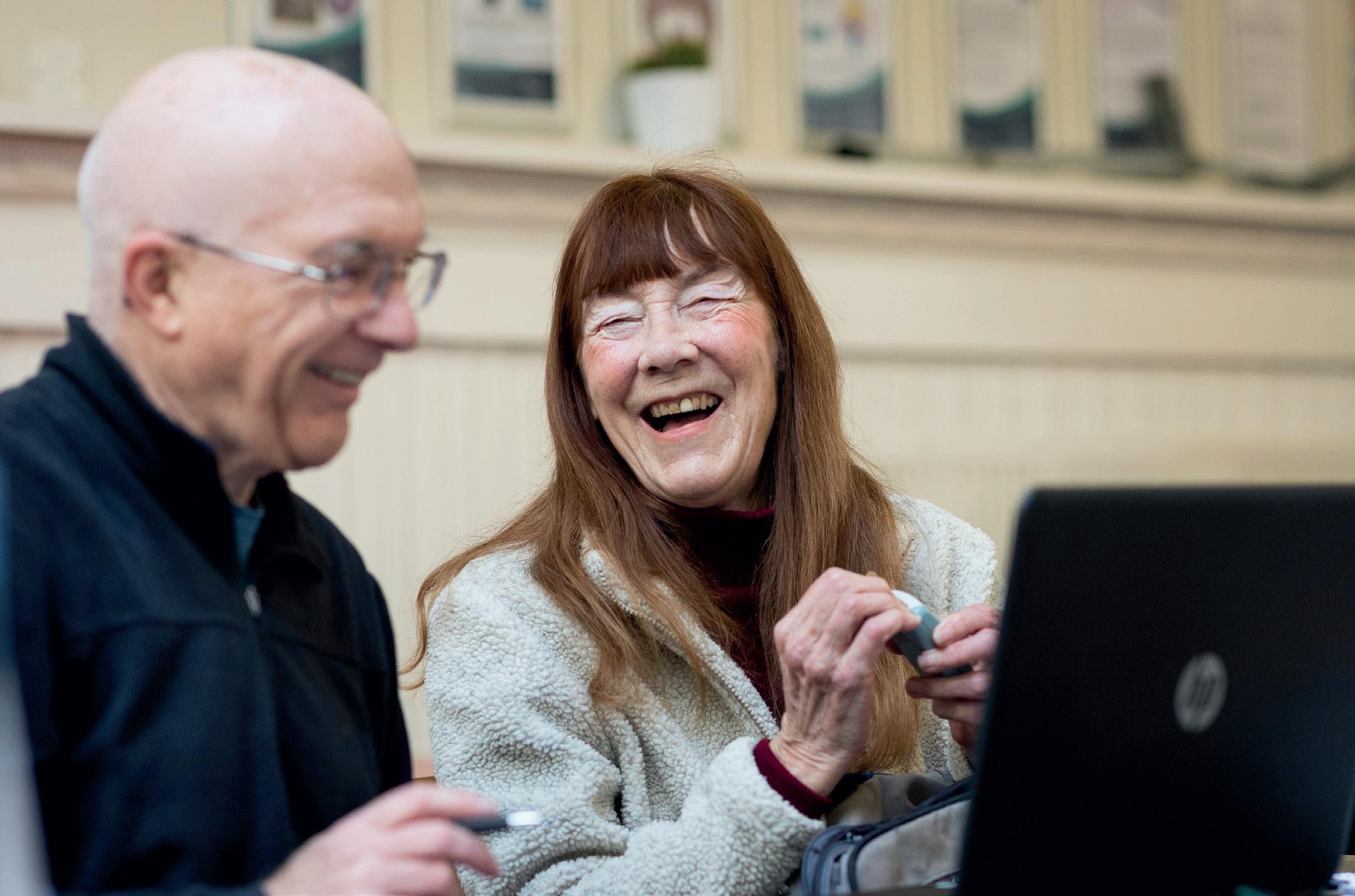
Anchor ’s commitment to digital inclusion reflects its dedication to ensuring that all residents have the opportunity to thrive and participate fully in an increasingly digital world.
Digital inclusion
Anchor places significant emphasis on digital inclusion as an integral component of its residents’ wellbeing offering - as part of its broader wellbeing service, Be Well.
The Be Digital initiative is specifically designed to promote residents’ integration into the digital sphere, providing them with the necessary tools and support to improve their digital literacy.
Through strategic partnerships with organisations such as Barclays Digital Eagles, Anchor offers comprehensive training and educational programmes that not only equip residents with essential digital skills but also promotes confidence and trust in navigating the digital landscape.
Its tablet loan scheme, accompanied by mi-fi devices, allows residents access to technology for an extended period, enabling them to stay connected and engaged for up to 10 weeks for the tablet and 6 months for the mi-fi device.
The organisation’s volunteering scheme also facilitates practical one-on-one support for residents. The online Be Skilled platform serves as a valuable resource for residents to further enhance their skills and knowledge at their own pace, fostering continuous learning and development.
By promoting digital inclusion through these multifaceted initiatives, Anchor recognizes the pivotal role that digital literacy plays in enhancing residents’ overall well-being. This holistic approach not only empowers residents with the necessary digital competencies but also promotes a sense of connectedness and engagement, contributing to improved mental and emotional health. Anchor’s commitment to digital inclusion reflects its dedication to ensuring that all residents have the opportunity to thrive and participate fully in an increasingly digital world.
Communities that are safe, with a good quality of life and homes people can afford are more sustainable in the long run. It’s why place-based approaches matter so much, both from the government but also from businesses.
Critically, Anchor priortitises an approach that tackles lonelineness and fosters a sense of community.
Anchor also works hard on ensuring its care homes are strongly linked in with their immediate community where they operate. A significant number of care homes have links with local schools and take part in reading sessions and other activities with residents and students.
All new Anchor housing sites being delivered by the development team are provided with Mechanical Ventilation and Heat Recovery (MVHR) systems. MVHR systems run continuously and because it is a balanced system most of the air entering the building passes through the filter in the MVHR system, therefore a significant proportion of outdoor pollutants are prevented from entering the building. Continuous ventilation also reduces the amount of water vapour, allowing moisture to escape and therefore reducing the possibility of condensation and mould growth.
All new projects are also fossil fuel free and utilise low and net zero carbon technologies such as air source heat pumps and renewable energy generation. These measures mitigate local emissions and pollutants and reduce the impact on air quality.
Anchor’s lettings policy aims to identify individuals with criminal or a history antisocial behaviour (ASB). This enables the organisation to counteract crime in its communities by ensuring during the letting process the home is suitably allocated and the individual can sustain the tenancy.
The organisation has an ASB, domestic abuse, and hate incident and crime policy which focuses on early intervention, support and community resolution. It aims to understand the root cause of the issue and understand if an individual requires support to reduce the incidents. Anchor works closely with support agencies as well as upholding a commitment to working with partnership agencies to manage and resolve these issues. The organisation actively monitors these cases, reviewing the length of time open, interventions and crucially the satisfaction of the person reporting the issue. Through customer satisfaction surveys Anchor monitors residents’ satisfaction in its approach to managing ASB, as well as supporting the resolution of ASB and crime issues through a dedicated team. Where there are ASB problems, the organisation seeks all options to reach a resolution including designing out the issue and improving security at affected sites.

Anchor prioritises external landscaping in developing and enhancing its new sites to the benefit of residents.
Its external spaces are designed to provide year-round interest through the careful selection of plants - as well as different flowering times and interplanting with winter and spring flowering. Anchor spaces are also designed to attract wildlife and excite the senses using colour, texture, sound, and scent.
Landscape designs provide opportunities for residents to walk, meet, socialise, and exercise throughout the year and are fully accessible for wheelchair users. Designs include raised beds and planters. These are clustered together to encourage residents to take part in communal gardening and promote interactions to help combat possible feelings of isolation. Residents are also encouraged to grow their own vegetables and flowers where circumstances allow.
Anchor also uses construction materials to help visually bind the internal and external spaces together. Spaces are designed into the landscape to encourage intergenerational activities such as picnics and informal play areas with grandchildren.
Development boundaries are designed to reflect the Secure by Design principles where practical but maintain the feeling of sensitive, secure, and attractive environments for customers to happily live in. Hard landscaped access and parking areas are also designed to offer safety to pedestrians, cyclists, and users of mobility scooters as well as vehicles.
Anchor actively encourages the use of SMEs in its supply chain with more than half of the companies it works with being part of a small or medium enterprise. It also considers letting contracts into smaller regions where appropriate which allows smaller companies to apply.
The organisation’s Social Value in Procurement policy encourages the supply base to consider the social value each contract will create and make commitments which will benefit the local communities, which uses the TOMs social value calculator to measure the impact of significant contracts.
VCSEs and social enterprises are encouraged to participate in tender activities and the number of smaller local contracts provides those opportunities.
The journey to net-zero Anchor has taken significant strides in its journey toward achieving net-zero, demonstrating its commitment to environmental sustainability. With 86 per cent of its rented and care homes at Energy Performance Certificate (EPC) Band C, the organisation is actively working to ensure that all properties meet these standards by 2030.
In a move to solidify its environmental commitment, Anchor has recently published an Environmental Sustainability and Net Zero Carbon Strategy (2023-26), outlining its overarching objectives to achieve net-zero status across all aspects of its operations and supply chain by 2050.
The organisation has also launched an electric vehicle car scheme, encouraging its employees to opt for more eco-friendly transportation options. Alongside this initiative, pilot charging points have been installed at two of its retirement villages, serving as a starting point to inform potential future expansion to accommodate electric vehicles acrossall its locations.
In line with its commitment to carbon neutrality and sustainable development, Anchor has integrated net-zero standards into the evaluation of its new development designs and construction protocols. This includes the incorporation of solar photovoltaic systems, as well as ground source and air source heat pumps where suitable - promoting energy efficiency and reducing carbon emissions.
Crucially, the organisation is undergoing a comprehensive SHIFT assessment, aiming to establish a comprehensive set of environmental metrics to ensure it meets its net-zero targets when assessing its environmental impact. These encompass various areas such as biodiversity, water
consumption, and waste management. By developing these specific metrics, Anchor is laying the groundwork for a more comprehensive understanding of its environmental impact and is poised to implement strategies that will lead to a reduction in its overall environmental footprint in the future.
Anchor views the energy transition as not only a need for the country and the world but as an opportunity to develop skills and foster the circular economy of the future.
The Greener Futures Partnership (GFP) is a collaborative partnership with four other social housing organisations to collaborate on innovation, procurement, and funding bids for green grants in support of retrofitting housing - across the five organisations’ portfolios.
One of the main themes of the GFP is the importance of green skills. The five organisations acknowledge they - on their own - cannot solve all of the skills shortages needed to secure a prosperous energy transition. The organisations are therefore coming together to indicate the scale of the need for these skills, and advise policymakers on where the investment is needed across the UK’s education system as well as working directly across the supply chains.
As part of the Greener Futures Partnership, research was commissioned into how to fill the skills gap in retrofitting. A deeper understanding of green skills and the types of roles needed to transition to a sustainable economy is crucial, as such the organisation investigated its own recruitment approach and focused on growing and developing skills internally. Anchor has undertaken vital work in this area with the GFP and the Centre for Social Justice.
Diversity extends beyond gender and ethnicity to sexuality, disability, and other issues that can lead to disadvantage. When we look across the leadership roles in business, the judiciary, government, and politics, there is a continued skew towards those from the most privileged backgrounds. Britain will not succeed unless and until its leadership roles, wherever they are found in our society, better reflect wider society.
Businesses like Anchor are taking a proactive approach, tracking diversity and fostering inclusion through strategic policy - underpinned by organisational values.
Anchor takes a proactive approach to tracking diversity within its workforce, acknowledging that what gets measured gets done. The organisation implements a comprehensive data collection process - beginning at the recruitment stage - which allows for the systematic monitoring of key diversity metrics.
An annual campaign, #CountMeIn, serves as a pivotal initiative to the tracking programme, encouraging all colleagues to provide updated diversity information, including age, sex, gender, gender different from birth, religion, sexual orientation, ethnicity, disability, and marital status.
The #CountMeIn campaign has achieved significant success - an impressive 85 percent response rate from Anchor colleagues during its most recent iteration. By tracking this data, Anchor can set specific goals for each group within its organisation.
The organisation maintains a strategic focus on aligning its workforce demographics with the broader working population of the UK, setting specific targets for representation across various dimensions of diversity. While achieving targets for ethnicity, sex, and LGBTQ+ representation, Anchor acknowledges the need for continued efforts to enhance the representation of individuals with disabilities within its workforce. By actively monitoring and addressing diversity metrics, Anchor remains dedicated to fostering an inclusive workplace where every individual feels respected and valued.
Anchor fosters a culture of diversity and inclusion amongst its colleagues through four colleague networks: enABLE, embRACE, Rainbow, and Inclusive Ambassadors. These networks include a number of dedicated colleague volunteers from various departments across Anchor. Their primary objectives are to provide peer support, offer guidance, and provide valuable feedback to the organisation.
The networks operate independently and organise approximately 3-4 meetings annually. Recognising the importance of their contributions, Anchor has incorporated network participation as an official objective within the annual appraisal process. This adjustment was implemented in direct response to feedback from network members, ensuring that their involvement is acknowledged as an integral aspect of their roles.
Anchor demonstrates its commitment to the networks by covering core members’ time and travel expenses for network meetings. To highlight the achievements and contributions of network members, the organisation regularly showcases their stories and experiences through workplace case studies, colleague magazines, and internal communications. Anchor’s CEO, executive members, and senior leadership actively participate in the
network meetings, providing an opportunity for members to engage in meaningful discussions on diversity, equity, and inclusion at the highest levels of the organisation.
In a bid to encourage active participation and engagement, network members are given the chance to participate in reverse mentoring sessions with the Executive Committee. Additionally, each network is allocated a budget of £1500 at the start of the financial year, providing them with the flexibility to utilise the funds as they deem fit.
One employee said of the networks: “The colleague networks at Anchor have so much to offer. From what I can see as a whole, though, they build communities within the organisation and create new relationships between colleagues from different parts of the business. They also help to work towards giving everyone an equal platform to be exactly who they want to be.
“The reason I joined the Inclusive Ambassadors network was because I knew I could be doing more. There is always an opportunity to take the responsibility to educate myself about important subjects surrounding Diversity and Inclusion and to challenge behaviours. I’ve recently volunteered to be one of the co-chairs of this network which has been a main focus for the past several months. Up until now, I’ve not taken part in many D&I activities, so I’m very keen to get involved in National Inclusion Week this year and get really involved with what the other networks are doing as well as promoting inclusion across the business.”
Anchor’s commitment to supporting an inclusive and diverse working environment is reflected in its comprehensive range of internal policies - carefully formulated to uphold the values of equality and fairness within the organisation. These policies, regularly reviewed and updated, cover a broad range
of issues including equality, diversity, and inclusion, harassment and bullying, flexible working, and support for individuals experiencing various life transitions such as maternity, paternity, and adoption.
To ensure the effective implementation of these policies, each undergoes an Equality Impact Assessment, stored and maintained by the policy team. The organisation recognises the pivotal role of its colleague networks as key communication channels for disseminating information and creating opportunities for underrepresented groups within Anchor. Regular updates from the Diversity and Inclusion manager, as well as engagement through the internal social media platform, Workplace, ensure continuous communication and support for these initiatives. The development of a colleague app is also underway, aiming to facilitate a more targeted approach to promoting opportunities across the organisation.
Anchor’s approach is underpinned by colleague-focused values. The organisation actively engages with individuals in an inclusive manner, prioritises the accessibility and appropriateness of its resources and services, ensuring they cater to the specific needs of various individuals and groups.
The organisation maintains a strict approach against any form of harassment or discrimination, aligning with its core value of ‘Respect’. Anchor expects all stakeholders, including colleagues, residents, contractors, and partners, to uphold this principle in their interactions with the organisation. It proudly supports several affinity groups, including the LGBT+ resident group, embRACE, LGBT+, Disabled, and Inclusive Ambassador colleague networks. These networks work closely with the D&I Manager and the wider organisation, contributing to policy reviews, advocating for diversity, and serving as allies for others.
As part of its commitment to promoting inclusivity, Anchor is a member of Inclusive Employers, a Stonewall Champion, and a signatory to the Care Leaver Covenant, showcasing its dedication to creating an inclusive and supportive environment for all.
The organisation also contributes to research initiatives such as the ‘No Place Like Home’ study - commissioned by HouseProud - the largest of its kind investigating the challenges faced by the LGBTQ+ community in accessing and thriving in social housing. This led to Anchor being an early adopter of the HouseProud Pledge, demonstrating its commitment to LGBTQ+ resident equality and support.
Anchor prioritises accessibility across its wide range of homes and properties. As such, the organisation has implemented dedicated training, comprehensive guidance, and robust processes that specifically address accessibility concerns. This approach extends beyond physical accessibility, considering individuals with hidden disabilities as well.
To ensure an inclusive environment, Anchor has established people-centered processes that facilitate the implementation of reasonable adjustments, guaranteeing that the needs of all individuals are met. Regular annual web accessibility audits are conducted to assess and improve the accessibility of digital platformsensuring that information and resources are readily available to all users.
Anchor also provides a support network for disabled and neurodiverse colleagues - ‘enABLE’. This network serves as a vital resource in the supportive community it strives to create, as well as in the provision of necessary guidance and assistance to ensure that all employees can thrive in their roles.
Demonstrating its commitment to fostering an inclusive workplace, Anchor proudly holds the status of a Disability Confident Employer, actively incorporating reasonable adjustments throughout the recruitment process to provide equal opportunities for all candidates and boosting social mobility for underrepresented groups.
For the sixth consecutive year, Anchor actively participated in National Inclusion Week. The annual event - taking place in late September to early October - serves as a platform to advocate for inclusivity in all its dimensions.
Led by the Diversity and Inclusion Manager and supported by colleague networks, Anchor curated an engaging lineup of activities for the week. These initiatives celebrate the diverse backgrounds and experiences of colleagues and residents throughout the organisation. By actively participating in National Inclusion Week, Anchor reaffirmed its commitment to creating a workplace culture that embraces diversity and fosters a sense of belonging for all.
Recognising the need for proactive and inclusive employment opportunities, Anchor actively supports DFN Project Search. DFN Project Search is a one-year transition to work programme for young adults with a learning disability and autism spectrum conditions.
Through this partnership it provides supported internships to young people with learning difficulties or autism. These internships offer young people the skills, experience, and knowledge to break down barriers to opportunity and find employment after education.
Anchor is currently supporting a cohort of interns over a year long programme, with the end goal of permanent employment with the organisation.

Anchor’s social impact approach is reflected in its committed efforts to deliver for its residents, break down barriers and empower its colleagues, and contribute significantly to the communities it serves.
The organisation delivers against Purpose Goal 3, focusing on providing diverse educational and employment opportunities. Through strategic partnerships with local schools, colleges and universities - such as the University of Bradford and Redcar and Cleveland College - Anchor actively fosters early exposure to the world of work, creating a pathway to employment with the organisation through practical experience. This commitment emphasises the organisation’s dedication to supporting individuals with a wide range of academic experiences.
Further up its talent pipeline, Anchor is displaying best practice against Purpose Goal 6 - Fair Career Progression. It is dedicated to nurturing the growth and development of its employees, and boosting their social mobility. The organisation’s comprehensive review of career pathways, coupled with the implementation of its Mentoring and Reverse Mentoring Programme, its progression agenda, The Moving Up programme and the organisation’s robust leadership development initiatives further solidify its dedication to promoting an inclusive and supportive work environment, enabling employees from diverse backgrounds to advance and succeed.
Recognising the profound impact of financial stability on individuals’ wellbeing, Anchor has implemented a range of initiatives to support its colleagues and residents in managing their finances and securing a stable financial future. Through this work, it delivers against Purpose Goal 7 - Widening Access to Savings and Credit. Through partnerships with Salary Finance and MoneyHelper, the organisation equips its colleagues with the necessary financial skills and knowledge. The ‘Be Wise’ service further serves as a crucial resource for residents, enabling them to maximise their income and secure their financial stability, contributing to improved overall wellbeing within its communities.
Anchor’s commitment to Purpose Goal 8Good Health and Wellbeing - is clear in its comprehensive array of initiatives aimed at promoting physical and mental wellbeing for both its employees and residents. The organisation’s health and wellness programmes, coupled with its mental health support services, offer comprehensive care
and support for all residents no matter their circumstances. Its Be Well services including the Be Active programme serve as valuable resources for residents seeking to improve their physical and mental wellbeing. Through its digital inclusion initiatives, Anchor is also closing the technological divide that often isolates the older generation - breaking down barriers to crucial services.
Anchor’s commitment to creating and maintaining a supportive and vibrant environment for its residents is comprehensively delivering against Goal 12 - Building Sustainable Communities. The organisation’s approach to community is underpinned by a focus on delivering the best environment for its residents across its homes and properties. It is implementing sector-leading measures to improve air quality, counteract crime, and create dynamic external spaces.
Across its key stakeholders - residents, colleagues, and communities - Anchor is boosting social mobility through diversity and inclusion. The organisation delivers against Purpose Goal 14 - Achieve Equality through Diversity and Inclusion - by actively tracking workforce diversity, and then applying these learnings to its extensive internal policy. The organisation’s commitment to accessibility across all of its sites also ensures that all individuals, whatever their personal circumstances, feel welcome.
In summary, Anchor’s comprehensive social impact approach is characterised by a dedication to its residents, and an acknowledgement that its resident offering is interconnected with its colleague agenda and community approach.
The organisation’s approach to community is underpinned by a focus on delivering the best environment for its residents across its homes and properties.
1 | Inclusive Progression: Take the next step on inclusion through socioeconomic diversity tracking
Anchor has already demonstrated a strong commitment to diversity tracking through its successful #CountMeIn campaign, which received an impressive 85% response rate in its latest iteration.
Building on this foundation, Anchor should consider the implementation of socioeconomic diversity tracking within the organisation. This initiative - as the next step on the organisation’s diversity and inclusion journey - will enable Anchor to gain a deeper understanding of the backgrounds of its colleagues, and identify any barriers that may exist within the organisation for individuals from under-resourced backgrounds.
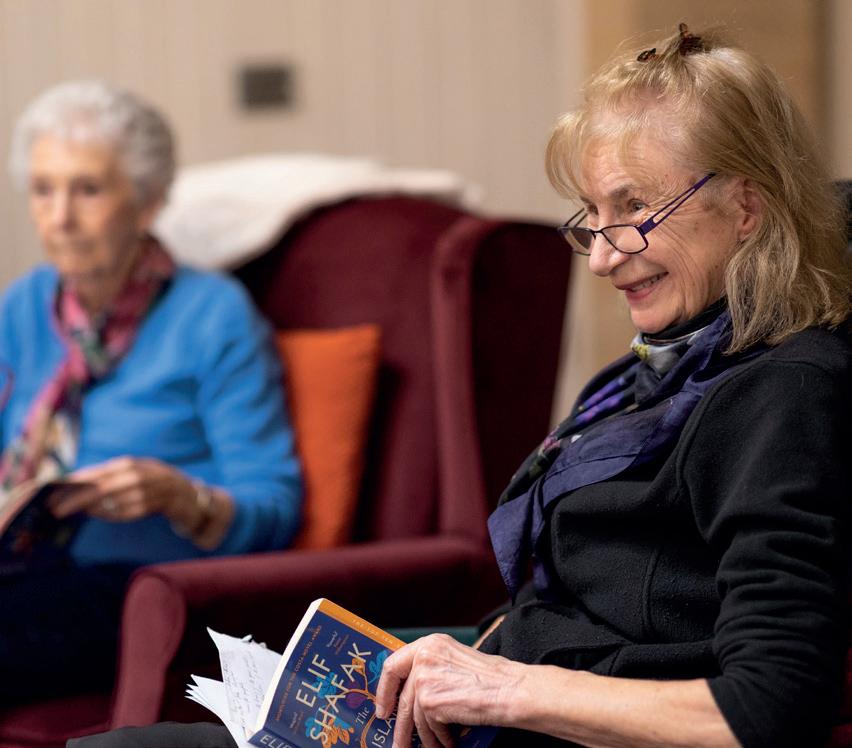
Implementing socioeconomic diversity tracking offers valuable insights into specific areas of the organisation where there might be challenges for colleagues from underrepresented and underresourced backgrounds. By focusing on intersectional challenges, Anchor can address the unique needs and experiences of individuals who face one or multiple forms of disadvantage.
This approach will help create a more inclusive and supportive environment, breaking down the barriers to opportunities for internal career development and advancement opportunities. The implementation of the tracking will support the organisation in aligning its workforce demographics more closely with the communities it serves through the identifying of specific barriers for specific groups.
Understanding the unique challenges faced by individuals from under-resourced backgrounds is crucial in designing targeted support programmes and initiatives that promote diversity and inclusion in all areas of all backgrounds.
By embracing socioeconomic diversity tracking, Anchor can proactively address any disparities and ensure that all colleagues have access to the necessary resources and opportunities for personal and professional growth.
2 | Colleague Offering: A sectoral leadership role in pay-gap reporting
Anchor, as displayed throughout this report, is a leader in the housing sector. It is the United Kingdom’s largest provider of specialised housing and care services, tailored to meet the needs of individuals in later stages of life.
It should look to apply this position not only in directly tracking diversity, as set out in Recommendation 1, but take a leadership role in the sector in achieving equality internally as an anchor institution in the sector by implementing both socioeconomic pay-gap reporting and ethnicity pay-gap reporting. These initiatives will provide valuable insights into the various factors that contribute to pay disparities within the organisation, enabling a deeper understanding of the wide range of intersectional challenges faced by different groups of employees.
Socio-economic pay-gap reporting will shed light on any discrepancies in pay that may arise due to differences in socio-economic backgrounds. By analysing this data, Anchor can identify any systemic barriers that may exist for employees from underprivileged backgrounds, allowing the organisation to develop targeted strategies and policies to address these disparities. This approach will not only help create a more level playing field for all employees but also promote a more inclusive and supportive workplace culture.
Similarly, ethnicity pay-gap reporting will enable Anchor to assess any discrepancies in pay that may be linked to employees’ ethnic backgrounds. This data will provide critical
Implementing socioeconomic diversity tracking offers valuable insights into specific areas of the organisation where there might be challenges for colleagues from underrepresented and under-resourced backgrounds.
insights into the specific challenges faced by employees from diverse ethnic backgrounds, allowing the organisation to develop tailored interventions and support systems to promote equity and fairness in the workplace.
By addressing these disparities, Anchor can foster a more diverse and inclusive workforce, where all employees have equal opportunities for career advancement and growth.
By combining socio-economic and ethnicity pay-gap reporting, Anchor can gain a comprehensive understanding of the various factors that contribute to pay discrepancies within the organisation. This insight will serve as a foundation for informing future internal policies and approaches, ensuring that the organisation remains committed to promoting diversity, equity, and inclusion at all levels. Additionally, transparent reporting on these gaps will showcase Anchor’s dedication to accountability and transparency, setting an industry-leading example for other organisations to follow.
3 | Community & Advocacy: Build intergenerational cohesion and grow children’s awareness of dementia and other age-related issues
One person every three minutes across Britain is diagnosed with dementia, with over 850,000 people living with dementia right now in the UK. Critically, this figure is expected to rise to more than 1.5 million by 2040.
As England’s largest not-for-profit provider of care and housing for people in later life, Anchor acknowledges the vital role it can play in transforming support for this and related issues, which all too often are taboo subjects until people reach older age.

Leveraging
its wide
scope in regions and communities across the country, and sectorleading expertise, Anchor can transform awareness and understanding among children and young people.
The organisation recently released its Reframing Dementia Guide, however there is potential to go even further.
Leveraging its wide scope in regions and communities across the country, and sector -leading expertise, Anchor can awareness and understanding among children and young people. Beginning with schools close to its key sites, the organisation should develop a opportunities to demystify and increase knowledge of dementia and brain health. Beginning conversations and knowledge at an early age for children across England would benefit communities while also helping to interest children in careers in social care.
As a leader in its field, Anchor should also look to use the programme to begin wider conversations in dementia education - calling on Government and key stakeholders to collaborate to reach as many children and families as possible.

4 | Outreach & Recruitment - Establish strategic partnerships with Purpose Coalition University partners
Anchor, as a purpose-led organisation, has established a number of key strategic relationships with universities across the UK through its comprehensive graduate programme and well-established relationship with the University of Bradford.
Taking advantage of the 20 committed members of the Purpose Universities Coalition, Anchor should look to deepen its ties with the higher education sector - strategically extending opportunities to Coalition universities.
Anchor could explore co-creating specialised programmes that align with the unique strengths and expertise of each coalition member.
By tailoring initiatives to the specific needs and goals of individual universities, the organisation will not only improve the relevance of Anchor’s engagement but also showcase its commitment to a bespoke, impactful collaboration, and reach more students through more effective targeting.
In leveraging the Purpose University’s Coalition, Anchor can not only deepen its ties within the higher education sector but also contribute meaningfully to its wider social impact goals on inclusive outreach and diverse recruitment.